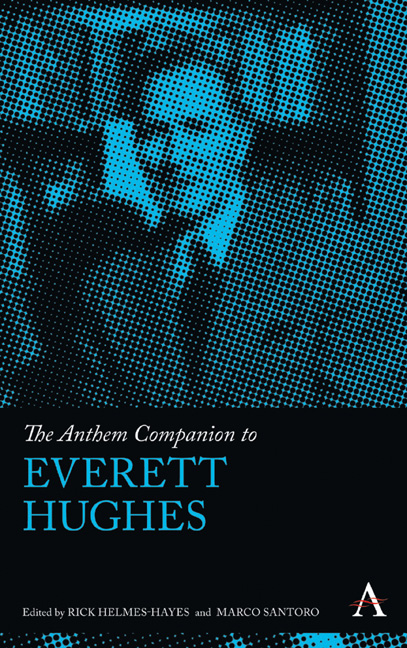Book contents
- Frontmatter
- CONTENTS
- List of Illustrations
- Foreword Everett C. Hughes, Great Teacher
- Insight through Craftsmanship: The Sociological Legacy of Everett Hughes
- Chapter One Everett Hughes and the Chicago Tradition
- Chapter Two Studying “Going Concerns”: Everett C. Hughes on Method
- Chapter Three The Natural History of Everett Cherrington Hughes: A Master of Fieldwork
- Chapter Four Everett C. Hughes: A Key Figure of the Canadian Chicago School Diaspora
- Chapter Five Everett Hughes: Notes from an Apprentice
- Chapter Six An American in Frankfurt: Everett C. Hughes's Unpublished Book on Germans after the End of the Nazi Regime
- Chapter Seven The Origins and Evolution of Everett Hughes's Concept: ‘Master Status’
- Chapter Eight Discovering the Secret of Excellence: Everett Hughes as a Source of Inspiration in Researching Creative Careers
- Chapter Nine Everett Hughes on Race: Wedded to an Antiquated Paradigm
- Notes on Contributors
- Index of Names
- Index of Subjects
Chapter Six - An American in Frankfurt: Everett C. Hughes's Unpublished Book on Germans after the End of the Nazi Regime
Published online by Cambridge University Press: 17 June 2017
- Frontmatter
- CONTENTS
- List of Illustrations
- Foreword Everett C. Hughes, Great Teacher
- Insight through Craftsmanship: The Sociological Legacy of Everett Hughes
- Chapter One Everett Hughes and the Chicago Tradition
- Chapter Two Studying “Going Concerns”: Everett C. Hughes on Method
- Chapter Three The Natural History of Everett Cherrington Hughes: A Master of Fieldwork
- Chapter Four Everett C. Hughes: A Key Figure of the Canadian Chicago School Diaspora
- Chapter Five Everett Hughes: Notes from an Apprentice
- Chapter Six An American in Frankfurt: Everett C. Hughes's Unpublished Book on Germans after the End of the Nazi Regime
- Chapter Seven The Origins and Evolution of Everett Hughes's Concept: ‘Master Status’
- Chapter Eight Discovering the Secret of Excellence: Everett Hughes as a Source of Inspiration in Researching Creative Careers
- Chapter Nine Everett Hughes on Race: Wedded to an Antiquated Paradigm
- Notes on Contributors
- Index of Names
- Index of Subjects
Summary
A Book Proposal
Early in March 1949 Everett C. Hughes sent a letter to the director of the university press of his home university. In it he described briefly two attachments: the outline of a proposed book and a sample chapter. The letter was a follow-up to some previous conversations between Hughes and his prospective editor. The ‘memorandum’ explains what the author wants to do. The ‘material’ for the proposed book would be the ‘diary’ that Hughes kept during his stay in Germany in the first half of 1948. The ‘form’ it would take would be a chronological first-person account.
My reason for preserving chronology is to keep the Mss [manuscript] an honest report of the development of my impressions. The diary is a record of what one American saw, thought and felt, not merely about Germany, but about being an American in an occupied country.
[…]
Tentatively, I suggest that certain theme or topical headings be set in here and there to indicate that a major incident of discussion of the given topic occurs at that point. (Everett C. Hughes, Memo on proposed book, Box 100, Folder 6, Everett C. Hughes Papers, Special Collections Research Center, University of Chicago Library)
The memorandum then lists a set of themes that would run through the manuscript and that would be brought to a head around one or more incidents or dramatic passages. As Hughes envisioned it, the book would have 13 chapter-like parts. What follows is a selective presentation of the tentative table of contents and illustrative remarks offered by Hughes.
Hughes starts by saying he would cover the moods of the Germans – ‘Ach, armes Deutschland!’ (Alas, poor Germany!). Some Germans he met had expressed the feeling they never again would be able to smile, everything was hopeless, it was a crime to express hope, celebrate holidays and so on. However, Hughes indicates that he met also spontaneous gaiety.
Hughes lists politicsas a second topic, which he intended to portray via accounts and descriptions of meetings, posters and informal talks. He notes that he had encountered different psychological complexes: the one claiming ‘all must share the loss equally’, which was connected with the notion of a ‘levelling-down democracy’, the ‘nothing can be done under occupation’ complex and the one that utters ‘better stay out of politics’.
- Type
- Chapter
- Information
- The Anthem Companion to Everett Hughes , pp. 149 - 172Publisher: Anthem PressPrint publication year: 2016

